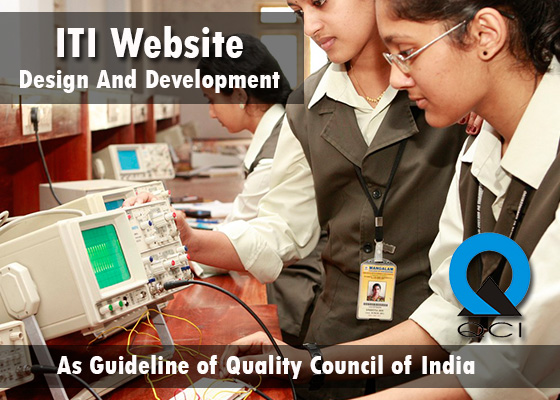Gee Dee Tech Training Centre

Gee Dee Tech Training Centre is situated in Coimbatore Tamil Nadu. Gee Dee Tech Training Centre is Industrial Training Institute under NCVT Gee Dee Tech Training Centre. Location of Gee Dee Tech Training Centre is 734 Avinashi Road, Near President Hall
Private ITI
Private ITI is leading educational organisatin in india. Teching facualty of Private ITI is suprimo. ITI is providing latest Job oriened cource for student. This Private ITI is powerd by 'Ministry of Skill Development and Entrepreneurship, Government of India for Craftsmen Training Scheme . ITI is registered by government under NCVT .
Tamil Nadu
Machinist
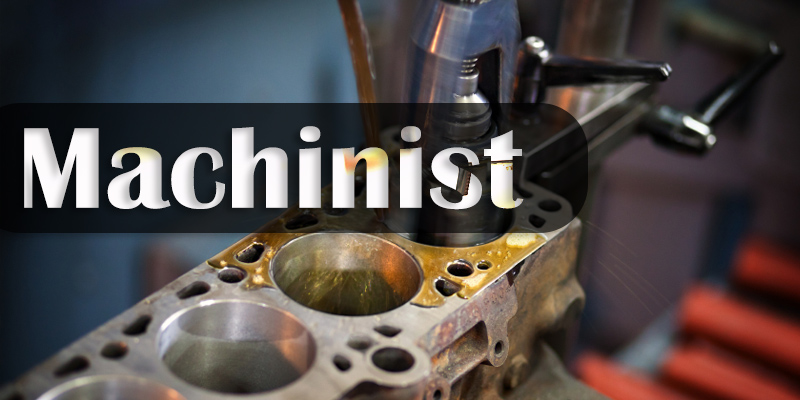
ITI trade Machinist is powered by NCVT. ITI trade Machinist is a job oriented trade ITI trade Machinist is suitable for government job and private job. This ITI trade Machinist is very powerful for self-empowerment. This ITI trade Machinist is perfectly design to fulfill industrial requirement of Indian Industries as well as International industries.
On successful completion of this course, the candidates shall be gainfully employed as:
• Machinist, Grinder, Operator of various types of power driven metal cutting or grinding machines in Production & Manufacturing industries,Infrastructure and defence organizations.
• Machinists have a wide scope of Employability ranging from self-employment, contractual employment to Industrial jobs.
International Comparability
- 1. Comparison Made with German Syllabus and the proposed syllabus is in line with the existing German Syllabus (Around 95% contents are matching).
- 2. However, ITI passed out trainees are getting employment in many Gulf countries, European countries, Australia, New Zealand, Singapore etc.
Progression Pathway
- Can appear in 10+2 examination through National Institute of Open Schooling (NIOS) for acquiring higher secondary certificate and can go further for General/ Technical education
- Can take admission in diploma course in notified branches of Engineering by lateral entry
- Can become supervisor after doing part-time diploma in relevant branch of Engineering.
- Can join Apprenticeship programme in different types of industries leading to National Apprenticeship certificate (NAC) after which they will be employed in industry as skilled worker and can become supervisor after doing part-time diploma in relevant branch of Engineering
- Can join Crafts Instructor Training Scheme (CITS) in the relevant trade after which they will be employed in ITI/ Vocational Training Institute as instructor
Technician Mechatronics
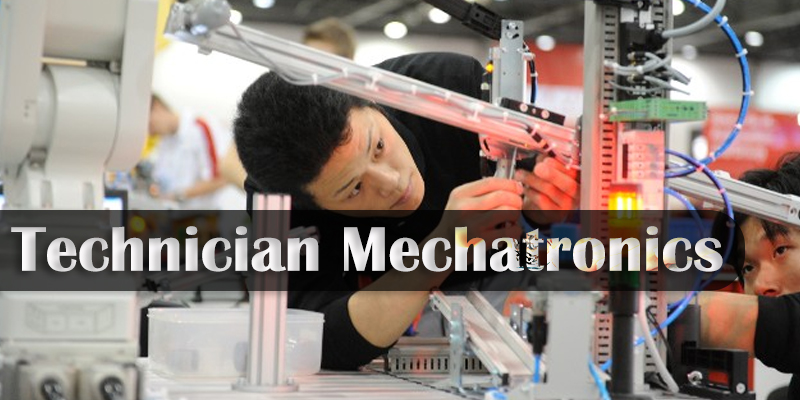
During the two years duration a candidate is imparted training on subjects Professional Skill, Professional Knowledge, Engineering Drawing, Workshop Science & Calculation and Employability Skills related to job role. In addition to this a candidate is entrusted to make/do project work and Extra Curricular Activities to build up confidence. The practical skills are imparted in simple to complex manner & simultaneously theory subject is taught in the same fashion to apply cognitive knowledge while executing practical task.
The course broadly covers all aspect of Skills required to work in the field of Mechatronics.
FIRST YEAR: In this year, the practical part starts with basic fitting work to make job as per specification applying different types of basic Fitting and machining viz., Drilling, Turning, Milling and Grinding operations. The trainee will be able to Produce components by different operations and check accuracy using appropriate measuring instrument. Apply different fits for assembling of components as per required tolerance, observing principle of interchangeability and check for functionality. Produce components involving different operation on Lathe, Milling and Grinding machine observing standard procedure and check for accuracy. The candidates also learn about basic computer operation such as MS-Office and basic troubleshooting related to the computer. The welding and brazing are also covered during this year. The safety aspects cover components like OSH&E, PPE, Fire extinguisher, First Aid and in addition 5S of Kaizen is being taught.
The imparted training on basic Electrical and Electronics sub-systems and its measuring techniques using appropriate Measuring instruments, Operate and troubleshoot AC/DC machines and drives. Acquire the skill of reading and analyzing Electrical and Electronics drawings. Construct, analyze and troubleshoot Electrical and Electronic circuits. Assemble and Disassemble Electrical and Electronic components by Soldering and de-soldering techniques. Carry out Industrial panel wiring. Understand and troubleshoot Protective devices in Electrical system. Understand the Digital logic circuits and its applications. Acquire computer skills such as Software installation. Knowledge on basic programming of Microcontroller and its Interfacing techniques, troubleshooting of electrical & electronics system are also covered.
SECOND YEAR: Operates CNC turn centre and CNC milling machine to produce simple components. The trainee also gets knowledge of different sensors viz., inductive, capacitive, magnetic etc and carries out related practical on the same. The student understands the principles of hydraulics, the basic functions of hydraulic systems and the functions of valves (flow control, pressure control, directional control). Attain the skill of reading and analyzing Hydraulic and Pneumatic drawings. Recognize circuit symbols and diagrams to ISO 1219, construct basic hydraulic circuits as per drawings, understand and follow safe practice. Acquire the knowledge on the functions of power packs, pumps, filters and reservoirs. Understand the units and measurement scales associated with compressed air system. Understand the functioning of standard pneumatic cylinders and valves, read pneumatic circuit diagrams and understand Pneumatic symbols. Construct simple pneumatic controls as per drawing. Read, understand and analyze Electro-Pneumatic circuit diagrams, understand fundamental terminology and symbols of Electro-Pneumatic control, understand the function and operation of a range of proximity sensors, read, interpret and construct motion diagrams. Construct multi- cylinder control circuit. Fault diagnostics procedure and Troubleshooting of Hydraulics and Pneumatics sub-systems. Executes programming on PLC.
The Trainee gets awareness on Robotics and its application, the trainee will be able to develop, test and troubleshoot circuits using simulator software for Electrical, Electronics, Hydraulic and Pneumatic systems. Able to fabricate and assemble while working model project on Mechatronics [Example: Project-“Pick and Place Mechatronics system” involving Fitting, Drilling, Turning, Milling, Grinding, Electrical wiring, programming, Hydraulic circuit assembly, Pneumatic circuit assembly, Drives, system assembly and Interfacing, functional testing, trouble shooting and repair. Safety measures in each stage.]
Tool & Die Maker (Dies & Moulds)
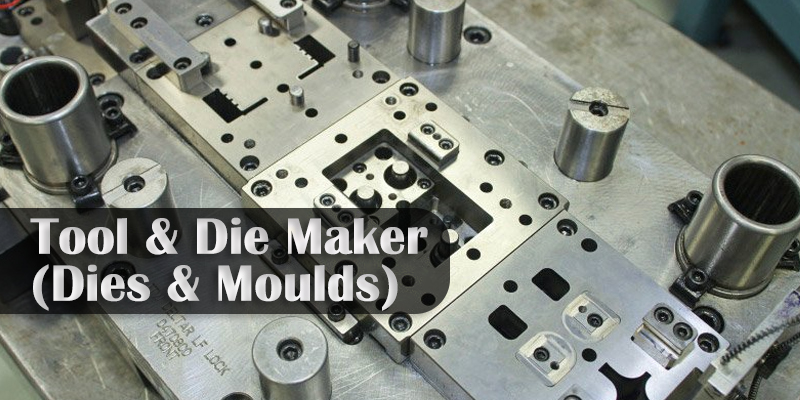
1. Introduction:
This course is meant for the candidates who aspire to become a professional Tool and Die maker (Dies & Moulds).
.
2. Terminal Competency/Deliverables:
After successful completion of this course the trainee shall be able to perform the following skills with proper sequence.
- 1. The trainees can work in the industry as semi-skilled Tool and Die Maker (Dies & Moulds).
- 2. The trainee can able to manufacture different components for dies & moulds by operating different machines like lathe, drilling, welding, milling grinding, EDM, Injection moulding and CNC. Inspection & measurement of different components and observing safety precautions while working.
- 3. The trainees can work on Dismantle & assemble of various dies & moulds and test.
- 4. Trainee is able to make simple programme on CNC machine and operate.
- 5. Handle different type of Fire extinguishers.
3.. Employment opportunities:
On successful completion of this course, the candidates shall be gainfully employed in
the following industries:
- 1. Production & Manufacturing industries.
- 2. Structural Fabrication like bridges, Roof structures, Building & construction.
- 3. Automobile and allied industries
- 4. Service industries like road transportation and Railways.
- 5. Ship building and repair
- 6. Infrastructure and defense organizations
- 7. In public sector industries like BHEL, BEML, NTPC, etc and private industries in India & abroad.
- 8. Self employment
Welder (Welding & Inspection)
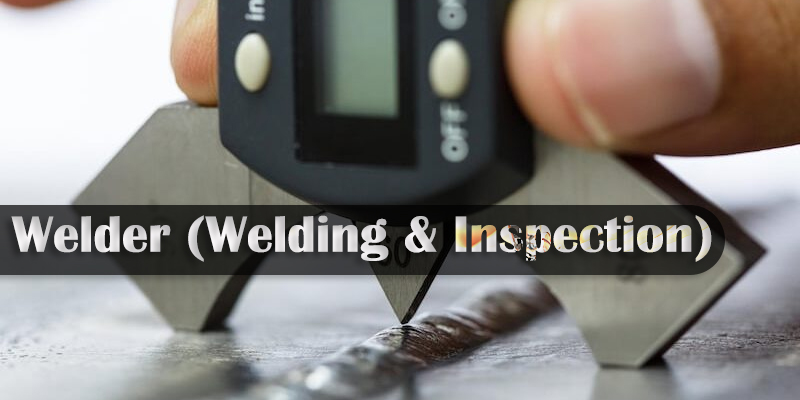
During the one-year duration a candidate is trained on subjects Professional Skill, Professional Knowledge, Engineering Drawing, Workshop Science & Calculation and Employability Skills related to job role. In addition to this a candidate is entrusted to make/do project work and Extra Curricular Activities to build up confidence. The practical skills are imparted in simple to complex manner & simultaneously theory subject is taught in the same fashion to apply cognitive knowledge while executing task. The practical part starts with basic welding work viz. gas welding, arc gauging etc. and performing different testing methods viz. bend test, tensile test, impact test, dye penetrant inspection etc. The broad components covered under Professional Skill subject are as below:
The practical part starts with basic welding and the candidate is imparted training on viz., Welding (Gas & Arc), pipe joints, MS sheet / plate joints which leads to multi-skilling. The safety aspects cover components like OSH&E, PPE, Fire extinguisher, First Aid etc. Perform visual inspection of metal by using different methods like bend test, tensile test, hardness test, impact test etc. The learner does practical of surface defects inspection by dye penetrant inspection, sub surface inspection by magnetic particle testing method, interprets radiographic films of weldments and prepares reports after welding inspection.
Professional Knowledge subject is simultaneously taught in the same fashion to apply cognitive knowledge while executing task. In addition, components like Physical properties of engineering materials, different types of iron, properties and uses, Heat & Temperature are also covered under theory part.
Projects need to be completed by the candidates in a group. In addition to above components the core skills components viz., Workshop calculation & science, Engineering drawing, employability skills are also covered. These core skills are essential skills which are necessary to perform the job in any given situation.
ITI Student Resume Portal
रिज्यूम पोर्टल का मुख्य उद्देश्य योग्य छात्रों की जानकारी सार्वजनिक पटल पर लाने की है जिससे जिन्हें आवश्यकता हो वह अपने सुविधा अनुसार छात्रों का चयन कर सकते हैं




